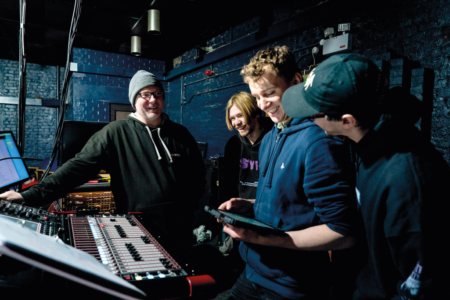
Many factors play a part in making a game go from good to great. From the plot to playability, visual effects to music, great games take everything into account to stand out from the more than 18,000 games released in 2024 alone. Of that number, only a handful make it onto the best video games list of the year – by Time, GameSpot, Polygon, or more.
The best game designers have the skills and knowledge to top such lists year after year. Whether it’s through the visual arts or technology development, they have what it takes to evoke that part in us hungry to be declared winners – much of which can be traced to their training at pioneering university departments.
After all, to become a visionary, you first have to walk and work amongst visionaries. The selection of universities below is exemplary of this. They are home to programmes that place you with different game designers, artists and institutions boldly leading this field to the next big thing.

Game Students at Abertay University share three traits: curiosity, creativity, and commitment to bettering game design and development. Source: Abertay University
Abertay University
There is a broad definition of what games are and what they can be at Abertay University. Its dedication to producing skilled graduates has seen it designated as the National Centre of Excellence in Computer Games Education. The global rankings of the undergraduate and postgraduate game design programmes – #11 and #6, respectively, by the Princeton Review 2024 – reflect the department’s commitment to the success of their students.
The MSc in Technical Art and Visual Effects is one of the first master’s programmes to specifically address the role of the technical artist sought after in games, immersive and Hollywood. This course explores the cutting-edge intersection of art and technology, equipping students with the skills and knowledge to shape the future of visual storytelling through compelling visual effects. Abertay University, renowned for its forward-thinking approach and state-of-the-art facilities including a virtual production and mocap studio, the only one of its kind in the UK, is the perfect place to nurture your talents and ambitions as a VFX or Technical Artist.
Meanwhile, the Professional Masters in Games Development (MProf) is a The Independent Game Developers’ Association (TIGA) accredited programme for aspiring professional developers. You’ll navigate industry projects with creative freedom, supported by experienced games industry practitioners and cutting-edge technology. Teaching here simulates professional studio development practices empowering you to develop the skills associated with your chosen discipline and apply these whilst working in teams to deliver complete game prototypes.
Also TIGA-accredited and British Computer Society-accredited is their longest running Masters- MSc in Computer Games Technology, ideal for those seeking to hone existing programming and creative skills to develop ‘AAA’ games or use game engines and LED walls to build realtime content for Hollywood and next generation live events.
Undergraduate programmes at Abertay are great stepping stones to lay your foundation in game design too. Created in consultation with industry, programmes like the BSc (Hons) Computer Games Technology, BA (Hons) Computer Arts, BA (Hons) Game Design and Production, and BSc (Hons) Computer Game Applications Development will equip you with the knowledge and skills today’s top employers need.
Abertay Graduates have forged successful careers in Ubisoft, Sony, EA, Rockstar North, Naughty Dog and many more. Others have gone on to set up their own game companies.
Learn more about what you can achieve at Abertay University here.

The University of Malta’s MSc in Digital Games encourages students to explore their approach to game creation by combining game design education with critical analysis or technology specialisations. Source: Institute of Digital Games – University of Malta Facebook
University of Malta
With over 130 academic publications, including conference papers, journal articles, books, and book chapters, the University of Malta’s Institute of Digital Games is known for its innovative games research. This impressive feat – given that the institute was only founded a little over a decade ago – showcases the university’s strength in furthering game design and development.
Led by a multidisciplinary team of experts in computer science, literature, game design, philosophy, media studies, and social sciences, students of the institute get a well-rounded education to forge their own achievements in the industry – sometimes even before they’ve even completed Malta’s MSc in Digital Games programme.
By delving into the theoretical and practical aspects of game design, students fully engage with the processes of game design and creation and logistical concerns such as project and business management. And while game design is at the heart of the programme, students will bolster their knowledge with either a focus on Game Analysis and Design or Game Technology and Design – two equally important aspects needed to produce a well-crafted game in today’s market.
Completing the programme will result in a fully-developed digital game or a theory-based dissertation. Whichever form their final project takes, graduates leave with game design knowledge to land careers in the games industry or pursue PhD-level studies with the research skills gained.

One of NYU Game Centre’s missions is to graduate the next generation of game designers, developers, entrepreneurs, and critics. Source: NYU Game Center Facebook
New York University
Located within New York University’s renowned Tisch School of the Arts, the NYU Game Centre is where students converge to bridge the gaps of design, production, and learning of games with advanced critical literacy.
Here, game industry titans lead the charge. Students learn from industry experts such as Frank Lantz, pioneer of the large-scale real-world games genre like PacManhattan, a life-size version of the arcade classic created by the students at NYU, and Eric Zimmerman, co-founder and Chief Design Officer of Gamelab, the game development company of Diner Dash, among many other iconic titles.
The Game Design (MFA) curriculum covers game design, digital game programming and development, game studies and scholarship, and a historical survey of games on and off the computer. The programme’s place within NYU also opens the doors to the rest of the university and its departments, allowing students to hone their game design-related knowledge with other skills. This means you could be screenwriting at NYU’s world-class film programme or working with hardware at NYU’s School of Engineering
As the focal point of the New York City game community, the centre is one of the best places to discover, explore, and create the next groundbreaking game. With this support – and those of the programme, school, and university – graduates end up in top game companies, including Riot Games, Arkadium, and Avalanche Studios Group.
*Some of the institutions featured in this article are commercial partners of Study International










